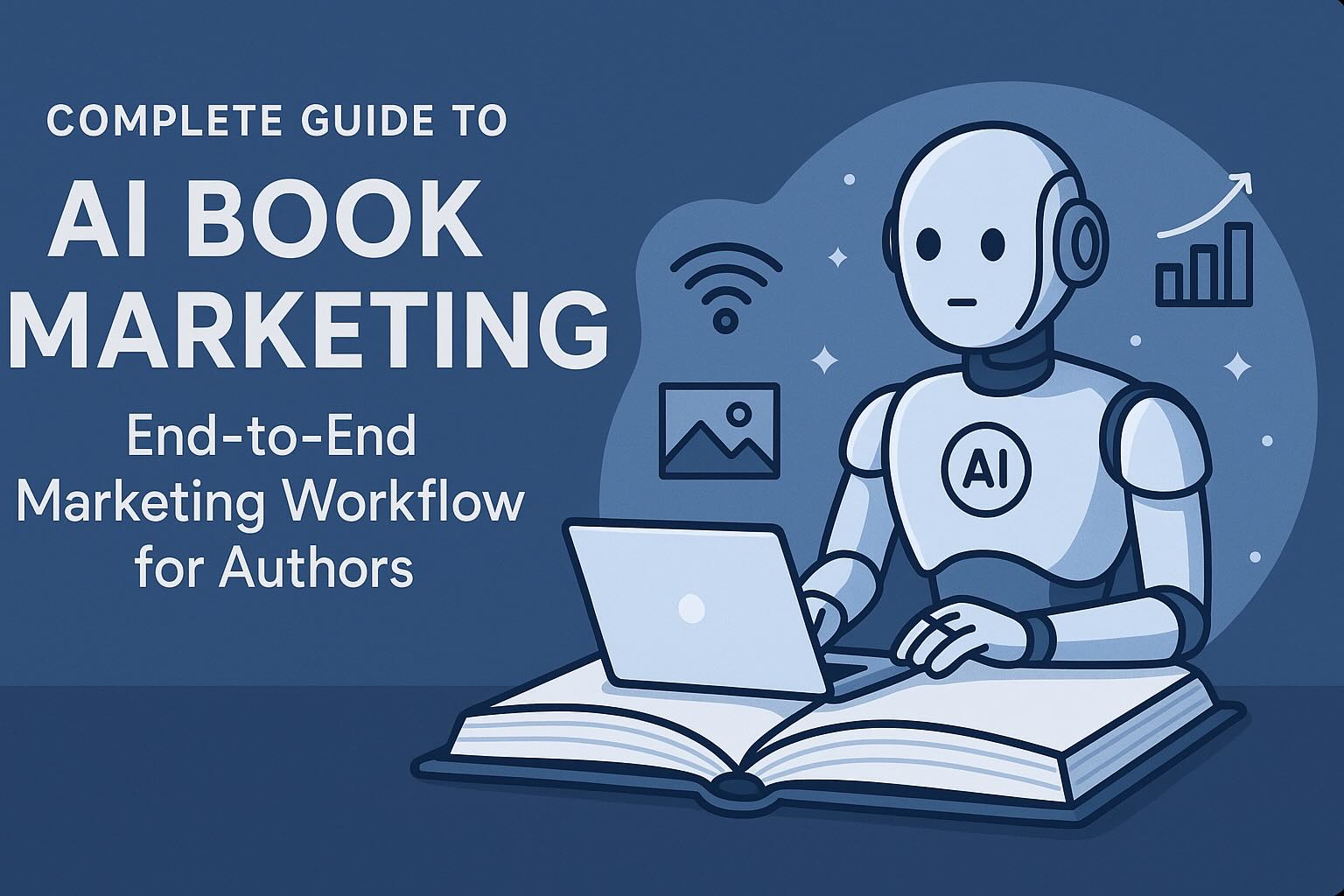Complete Guide to AI Book Marketing: End-to-End Marketing Workflow for Authors (2026)

Quick Answer
How can AI transform your book marketing workflow in 2026?
AI-powered book marketing automates every stage from pre-launch strategy to long-term sales optimization, reducing marketing time by 70-80% and increasing conversion rates by 30-40%. The complete workflow includes:
Essential AI Marketing Stack:
- Pre-Launch (60 days out) - Automated audience research, marketing copy generation, and metadata optimization
- Launch Phase - Coordinated social media, email campaigns, and optimized Amazon advertising
- Long-Term Growth - AI-driven analytics, content repurposing, and continuous optimization
Average ROI: Authors implementing AI marketing see 40-60% higher launch velocity and 2-3x better long-term sales compared to traditional methods.
📚 Publishing Workflow Context: This guide focuses on marketing strategy and execution. For the complete book publishing process including editing, cover design, and metadata preparation, see our AI-Powered Book Publishing Guide.
Table of Contents
- Introduction: Modern Book Marketing with AI
- Foundation: Understanding Your Market with AI
- Pre-Launch Strategy (60 Days Before Release)
- Launch Phase: Release Week Execution
- Post-Launch Growth: Long-Tail Strategy
- Tools & Budget Recommendations
- Case Studies & Real Results
- FAQs
Introduction: Modern Book Marketing with AI
The harsh reality of modern book publishing: the average self-published book sells fewer than 250 copies in its lifetime. The difference between obscurity and success isn't quality—it's marketing execution. In 2026, with over 2.3 million new books published annually, visibility is everything, and AI has emerged as the great equalizer.
Traditional book marketing demands brutal time investment: 4-6 hours building audience personas, 1-2 hours daily creating social content, 8-12 hours researching advertising platforms, and 4-8 hours weekly testing ad variations. For authors already juggling writing, editing, and publishing logistics, this workload is simply unsustainable.
AI-powered marketing automation changes the equation: 70-80% of these tasks can be automated while maintaining—or even improving—quality and effectiveness. Authors who integrate AI into their marketing workflow report 30-50% faster time-to-market, 50-70% lower marketing costs, and 40-60% better launch performance compared to traditional methods.
The Marketing Challenge Modern Authors Face
Amazon's algorithm determines 35% of all book sales through their recommendation engine. Google's search results now feature AI Overviews in 13% of queries. Social media platforms use AI to decide what content 71% of users see. If you're not marketing with AI-optimized strategies, you're essentially invisible to the systems that drive discovery.
The problem isn't just competition—it's complexity:
- Platform Fragmentation: Readers discover books across Amazon, BookBub, Goodreads, TikTok, Instagram, and dozens of other channels
- Content Demands: Effective marketing requires constant content creation across multiple formats
- Budget Constraints: Independent authors compete against publishers with million-dollar marketing budgets
AI levels the playing field by giving solo authors access to tools and capabilities that were once reserved for marketing departments. For a detailed comparison of the best AI tools for writing, editing, and marketing, see our comprehensive guide to AI tools for authors.
The Real ROI: Time, Money, and Mental Energy
Traditional Marketing Approach (90-day launch):
- Time: 120-180 hours
- Costs: $2,000-7,000 (consultant + advertising + tools)
- Results: 100-500 books sold
AI-Powered Marketing Approach:
- Time: 30-50 hours (strategy + oversight)
- Costs: $550-2,500 (AI tools + advertising)
- Results: 200-800 books sold (40-60% improvement)
Foundation: Understanding Your Market with AI
Effective marketing starts with knowing exactly who will love your book and where to find them. Traditional market research demanded weeks of manual analysis. AI transforms this into a 10-minute data-backed process.
AI-Powered Audience Research
The foundation of any marketing strategy is understanding your target readers: their demographics, psychographics, reading habits, and online behavior.
Traditional Approach: 20-40 hours manually analyzing reviews, browsing forums, and building spreadsheets.
AI-Powered Approach: ManuscriptReport's marketing package analyzes your complete manuscript in 10 minutes to automatically create:
- Detailed Reader Personas: 3-5 specific audience profiles with demographics, interests, reading preferences, and where to target each
- Comparative Titles: 10 similar books with proven market success and overlapping readership
- Messaging Angles: Blurb and hook variations with emotional triggers that drive purchase decisions
- Keywords: 20+ researched keywords for metadata optimization and organic discovery
- Ad Copy: Genre and book specific ad angles that follow best-practices
- And other 10 marketing assets: categories, synopsis, back-of-the-book summary, press release template, sales pitches, a marketing plan and more
- Guides and Examples: Each section comes with a guide and examples on how and where to use it.
Investment: $49.99 one-time
Time Savings: 40-100 hours
Optional Add-Ons for Complete Execution:
- Social Media Content Package ($60): 20 ready-to-post images and captions from your book's most compelling scenes, optimized for 10 different marketing angles using genre-specific best practices
- Blog Series Package ($35): 6-10 long-form SEO articles based on your book's most compelling themes for content marketing
Deep Dive: For detailed implementation strategies, see our guide: How to Use AI to Market a Book.
Competitive Analysis & Genre Trends
Understanding what's already working in your genre is critical for positioning. Modern AI tools can analyze the top 50-100 bestsellers in your category to identify:
- Common keywords and description structures that convert
- Pricing strategies and discounting patterns
- Underserved reader segments and keyword opportunities
- Genre-specific trends and platform preferences
Tools for Analysis:
- Publisher Rocket ($199 one-time): Amazon keyword and category research
- K-lytics ($47-166/month): Genre-specific market intelligence
- ChatGPT/Claude (Free-$20/month): Competitive analysis and trend identification
Related Resource: Our 7 AI-Driven Tactics to Boost Book Marketing guide covers tactical implementation across multiple channels.
Pre-Launch Strategy (60 Days Before Release)
The most successful book launches don't start on release day—they start 60-90 days earlier with systematic audience building, content creation, and strategic positioning.
Core Marketing Assets (Days 60-45)
Essential Materials:
Book Description/Blurb Variations
- Hook-focused, plot-focused, and character-focused versions
- AI generates 5-7 variations; test which converts best
- Monitor: views → sample downloads → purchases
SEO-Optimized Metadata
- 7 Amazon backend keywords
- 10-20 long-tail keyword variations
- Category strategy (competitive + niche categories)
Time Investment: 1-2 hours
ROI: 40-60% improvement in organic discoverability
Implementation: See AI Keyword Research for Books and AI for Book Metadata SEO for detailed strategies.
- Visual Assets
- 10-15 social media graphic templates
- Email headers and ad creative mockups
Content Creation at Scale (Days 45-30)
30-Day Social Media Calendar:
Subscribe & Get Your Free Marketing Plan Template
Receive regular updates on marketing best-practices, AI shortcuts, and get our proven 4-phase marketing roadmap for free.
Unsubscribe anytime.
Modern AI generates a complete month of platform-optimized posts:
- Facebook/Instagram: 15-20 posts (20% promotional, 80% value/engagement)
- Twitter/X: 10-15 thread starters
- TikTok/Reels: 5-10 video scripts
AI Generation Options:
- DIY: ChatGPT Prompt: "Create a 30-day social media content calendar for my [genre] book about [theme]. Mix promotional (20%) with engagement (40%) and value-added (40%) content. Target: [persona]."
- Done-For-You: ManuscriptReport's Social Media Package ($60): 20 ready-to-use posts with professional images extracted from your book's most compelling scenes, optimized across 10 marketing angles using genre-specific best practices. Works as organic content or paid ads.
- Scheduling: Use free tools like Hootsuite or Buffer
Time Savings: 90 minutes/week → 15 minutes/week
Platform Strategies: AI Social Media Content for Authors covers advanced tactics.
Email Marketing Sequences:
Build these automated sequences pre-launch:
- Welcome Sequence (3-5 emails): Thank you, author story, exclusive preview, release announcement
- Launch Sequence (5-7 emails): Release announcement, early reviews, bonus offers, final push
Email subscribers convert at 5-10x the rate of social media followers.
ARC Distribution & Review Building (Days 30-15)
Reviews are social proof that drives purchases. Goal: 15-25 reviews on launch day.
AI-Optimized Strategy:
- Identify book bloggers, Goodreads reviewers, and BookTubers in your niche
- Generate personalized pitch emails (avoid generic templates)
- Automate follow-up scheduling
Results: Systematic ARC distribution averages 20-30 reviews in first week vs. 3-5 without strategy.
Launch Phase: Release Week Execution
Launch week is your highest-visibility opportunity. Concentrated effort during this 7-14 day window determines long-term success.
Day 1: Release Day Execution
The First 24 Hours Are Critical
Amazon's algorithm rewards velocity—books selling quickly in first 24-48 hours receive algorithmic boosts in recommendations and rankings.
Release Day Checklist:
- Email: Send to full subscriber list with direct purchase link
- Social Media: Coordinated posts across all platforms within 2 hours
- Paid Ads: Launch Amazon Ads, Facebook/Instagram ads, BookBub (if approved)
Expected Results: 50-200 sales in first 24 hours (varies by genre and list size)
Amazon Advertising with AI Optimization
Amazon Ads is the highest-converting platform for book sales.
Campaign Setup:
Keyword Campaigns
- Identify 50-100 relevant keywords
- Organize: broad match, phrase match, exact match
- Daily budget: $10-20 initial test
Product Targeting
- Target competitor ASINs
- Target category pages
- Higher bids for proven bestsellers
AI Optimization Tools:
- BidX/AdBadger ($99-299/month): Automated bid management
- Manual + AI: Weekly export → ChatGPT analysis: "Analyze this search term report. Identify: high-spend low-conversion keywords to pause, high-conversion keywords to increase, new opportunities, negative keywords. Target ACoS: 40%."
Performance Expectations:
- Initial ACoS: 60-100% (first 30 days)
- Optimized ACoS: 30-50% (after 60-90 days)
- Goal: Break-even while building reviews and rankings
Advanced Strategies: AI Amazon Ads Optimization provides detailed bidding tactics.
Week 1: Momentum Maintenance
Daily Activities (2-3 hours/day):
- Share reader reactions and early reviews
- Post daily updates (milestones, testimonials)
- Monitor ads, pause bad keywords
- Test ad copy variations
- Follow up with ARC reviewers
Expected Results: 30-100 sales in first week, 15-30 reviews by day 7
Post-Launch Growth: Long-Tail Strategy
Launch week ends, but marketing never does. Long-tail marketing generates sales months and years after publication.
Months 2-3: Data-Driven Optimization
AI-Powered Analytics:
Use ChatGPT/Claude to analyze your launch data:
- Which channels drove most sales?
- Which ad variations had highest ROI?
- Which reader segments converted best?
Review Sentiment Analysis: Prompt: "Analyze these 30 reviews. Identify: 5 most-praised elements, reader demographics, recurring criticisms, suggested marketing angles."
Use insights to refine targeting and messaging.
Content Repurposing at Scale
Your book is an evergreen content engine. AI makes repurposing effortless:
Blog Posts: Extract 6-10 SEO-optimized posts from manuscript targeting long-tail keywords
- DIY: Use ChatGPT to extract themes and create article outlines
- Done-For-You: ManuscriptReport's Blog Series Package ($35): 6-10 publication-ready long-form articles based on your book's most compelling themes, optimized for SEO and organic traffic
Social Media: Generate 30 post ideas per chapter (quotes, discussion questions, behind-scenes facts)
Video Scripts: Create character deep-dives, scene breakdowns, author readings
Email Sequences: Convert one-time buyers to loyal readers with bonus content
Long-Term Visibility (Months 4-12)
Quarterly Marketing Pushes:
Instead of constant promotion, plan strategic campaigns:
- Q1 (Months 4-6): Price promotion + advertising push
- Q2 (Months 7-9): Content marketing + guest posts
- Q3 (Months 10-12): Series launch or next book
Evergreen Amazon Ads:
- Daily budget: $5-15
- Target only proven keywords
- Aim for 30-40% ACoS
- Goal: Steady sales + algorithmic visibility
Building Reader Community
Long-term success = readers who buy everything you write.
Strategies:
- Monthly Q&A sessions
- Exclusive content for subscribers
- Early access to next book
- Behind-the-scenes updates
Retention Metrics:
- Goal: 20-40% of Book 1 readers purchase Book 2
- Email list growth: 100-500 subscribers per launch
- Reviews: 50-100 total by month 12
Tools & Budget Recommendations
Your ideal AI marketing stack depends on author type, budget, and technical comfort.
Budget Tier: $0-100/month
Free Tools:
- ChatGPT Free, Canva Free, MailerLite Free, Hootsuite Free
Critical Investment:
- ManuscriptReport ($49.99 one-time): Complete marketing analysis
- Amazon Ads ($100-300/month): Highest-converting platform
Optional Add-Ons:
- ManuscriptReport's Social Media Content Package ($60): 20 posts + images
- ManuscriptReport's Blog Series Package ($35): 6-10 SEO articles
Total: $100-300/month (Amazon Ads) + $50-145 one-time (tools)
Best For: First-time authors testing strategies
Professional Tier: $360-890/month
Budget Tier plus:
- ChatGPT Plus/Claude Pro ($20/month)
- Canva Pro ($10/month)
- ConvertKit ($29-59/month)
- Amazon Ads ($300-800/month)
Total: $359-889/month
Best For: Authors with 2-5 published books
Premium Tier: $550-1,480/month
Professional Tier plus:
- BidX/AdBadger ($99-299/month): Automated bid management
- K-lytics ($47-166/month): Market intelligence
- Jasper/Copy.ai ($49-125/month): Content generation
- BookBub promotions ($100-500 per promotion, as needed)
Total: $554-1,479/month
Best For: Full-time authors with 6+ books
ROI Expectations
Example: Professional Tier Mid-Range ($600/month)
- eBook royalty: $3.50 per sale
- Breakeven: 172 books/month (5.7 books/day)
- Month 1-3: Breakeven (building visibility)
- Month 4-6: 2x ROI (344 sales = $1,204 revenue, $600 profit)
- Month 7-12: 3-5x ROI (organic growth compounds)
Reality Check: Not every book profits on ads. Goals:
- Breakeven while building reviews/rankings/email list
- Profit on series sell-through
- Compound growth as each book strengthens brand
Case Studies & Real Results
Case Study 1: Black Rose Writing - Publisher Success
Challenge: Streamlining marketing across hundreds of titles while empowering authors
Solution: Integrated ManuscriptReport's AI analysis into standard workflow for:
- Internal marketing development (ad copy, press releases)
- Metadata validation (keywords, categories, comps)
- Author empowerment (objective insights, content starting points)
Results:
- Eliminated first-draft phase for marketing materials
- Reduced prep time from weeks to days per title
- Empowered authors with ready-made content
- Cost-efficient analysis across entire catalog
"The reports eliminate a first draft concept, moving most of our actions into step two immediately... Definitely [saves time]!" — Reagan Rothe, Owner
Full Case Study: Black Rose Writing Publisher Workflow
Case Study 2: Ross & Deborah - Fantasy Authors Marketing 7 Books
Challenge: Two Milwaukee fantasy authors with zero marketing experience, struggling with copy, comps, and targeting for their 7-book catalog.
Solution: Used ManuscriptReport as the backbone of their entire marketing workflow:
- Comp titles for BookBub ad targeting
- Themes and genres for positioning and keywords
- Sales pitches for ad copy and social media
- Summary section for descriptions across platforms
Results:
- Reduced copy time from 20-30 hours per book to minutes
- Created systematic, repeatable marketing workflow
- Transitioned from traditional to self-publishing with confidence
- Built 5,000+ subscriber newsletter using report insights
"I was shocked at how well it analyzed the book… It was the first time I realized AI is something different." — Ross Hightower
Full Case Study: Ross & Deborah Fantasy Authors Case Study
Case Study 3: First-Time Author Launch
Profile: Sci-Fi author, zero platform, $500 budget
Strategy:
- ManuscriptReport Marketing Report ($49.99)
- Email list: 150 subscribers via free chapters
- AI social content + Buffer Free
- Amazon Ads ($300 week 1, $100/month ongoing)
90-Day Results:
- 420 books sold
- $1,470 revenue ($3.50/book)
- $550 spend
- $920 profit (168% ROI)
- 380 email subscribers
- 40 reviews
Key Factors: AI assets on minimal budget, focused Amazon Ads, systematic reviews, email building
Frequently Asked Questions
1. How much does book marketing cost?
Book marketing costs range from $150-1,500/month depending on your strategy:
- Budget approach: $150-300/month (Amazon Ads + free AI tools)
- Mid-range: $400-900/month (adds email marketing, scheduling tools, AI copywriting)
- Professional: $550-1,500/month (includes automated bid management, market intelligence, BookBub promotions)
Most authors start with $200-400/month and scale based on ROI. Using AI tools reduces costs by 40-60% compared to traditional marketing agencies.
2. What's the best way to market a book on Amazon?
The most effective Amazon book marketing strategy combines:
- Keyword-optimized metadata (title, subtitle, description, 7 backend keywords)
- Amazon Ads targeting relevant keywords and competitor books ($10-20/day starting budget)
- Review building to 15-30 reviews in first month through ARC readers
- Category optimization placing your book in 2-3 competitive but winnable categories
AI tools can automate keyword research, ad optimization, and copy generation—reducing setup time from weeks to hours while improving conversion rates by 30-40%.
3. How do I find my target audience for my book?
Identify your book's target audience by:
- Analyzing reader reviews of similar bestselling books
- Researching where readers gather online (subreddits, Facebook groups, hashtags)
- Creating 3-5 detailed reader personas with demographics, interests, and reading habits
AI automation: Tools can analyze your full manuscript in minutes to automatically generate reader personas, comparative titles, and discovery channels—a process that traditionally takes 20-40 hours of manual research.
4. How long does it take to see results from book marketing?
Timeline varies by channel:
- Amazon Ads: Results within 24-48 hours, optimize over 60-90 days
- Email Marketing: Immediate (30-50% conversion), requires list building
- Social Media: 3-6 months for engagement and following
- SEO Content: 3-6 months to rank, drives long-term traffic
Most authors see breakeven within 90 days and 2-3x ROI within 6-12 months when using comprehensive multi-channel strategies with AI optimization.
5. Can I market my book with no budget?
Yes, using free strategies:
- Free AI tools (ChatGPT, Claude) for content creation and strategy
- Social media posting in reader communities and author groups
- Content marketing through blog posts and Medium articles
- Email list building with free platforms (MailerLite, Substack)
- Guest posting and podcast appearances
- Goodreads engagement and reader group participation
Reality check: Organic-only marketing takes 6-12 months to build meaningful traction. A minimal budget of $150-300/month for Amazon Ads typically accelerates results significantly.
6. Do fiction and nonfiction books need different marketing strategies?
Yes:
Fiction:
- Emotional engagement, story hooks
- Amazon Ads, BookBub, social media, book bloggers
- Readers browse for entertainment and discover through recommendations
Nonfiction:
- Authority building, problem-solving content
- SEO blogs, LinkedIn, podcast appearances, speaking
- Readers actively search for solutions to specific problems
Bottom line: Fiction thrives on paid ads and social proof; nonfiction benefits from long-form content and platform building.
7. What metrics should I track for book marketing?
Key metrics to monitor:
Sales Performance:
- Daily/weekly sales velocity
- Amazon Best Seller Rank (declining = improving)
- Month-over-month revenue trends
Advertising:
- Amazon Advertising ACoS (target 30-50%)
- Cost per click (CPC) and conversion rate
- Return on ad spend (ROAS)
Audience Growth:
- Email list growth (100-500 per launch)
- Review count (15-30 first month, 50-100 by month 6)
- Website traffic and keyword rankings
Overall ROI: (Revenue - Marketing Spend) / Marketing Spend × 100
AI analytics tools can automatically identify optimization opportunities from this data.
Your Next Steps: From Strategy to Execution
You've now seen the complete AI-powered book marketing workflow. The question isn't whether to adopt AI marketing, but how quickly you'll implement these strategies.
Immediate Actions (This Week)
- Assess Your Stage: Pre-launch, launch imminent, or already published?
- Get Marketing Foundation: Analyze your manuscript for audience insights and marketing copy
- Choose Your Stack: Start with Budget Tier, test ROI, then upgrade
Building Long-Term Success
Your competitive advantage comes from:
- Systematic Execution: AI handles tactics, you focus on strategy
- Data-Driven Optimization: Test, measure, double down on what works
- Multi-Channel Presence: Don't rely on single platform
- Continuous Learning: AI capabilities evolve monthly
Additional Resources
Tactical Guides:
- 7 AI-Driven Tactics to Boost Book Marketing
- How to Use AI to Market a Book
- AI Social Media Content for Authors
Platform-Specific:
Asset Creation:
Publishing Workflow:
The Difference Between Obscurity and Success
The average self-published book sells 250 copies in its lifetime. Not because of quality—because of marketing execution.
AI-powered marketing tools don't replace your creativity, judgment, or authentic connection with readers. They simply ensure technical execution matches the quality of your writing. They give you the same capabilities publishers provide their authors—audience research, professional copy, multi-platform campaigns, data-driven optimization—but accessible at indie author budgets.
Your manuscript represents months or years of creative work. Give it the best possible chance at finding its audience.
The next bestseller won't be marketed entirely by AI. But it will almost certainly be discovered, promoted, and sold with AI's assistance.
Ready to transform your book marketing from guesswork to data-driven strategy?
Start with ManuscriptReport's Complete Marketing Package →
Generate your book's complete marketing strategy, audience analysis, and publication-ready assets in 10 minutes. Used by 1,000+ authors and publishers worldwide. Starting from $49.99.
About This Guide: This comprehensive resource is regularly updated to reflect the latest AI marketing tools and strategies. Last updated: December 23, 2025. For questions about implementing AI in your book marketing workflow, contact our team.
Enjoyed this article? Subscribe for more + get a free marketing roadmap template.
Receive regular updates on marketing best-practices, AI shortcuts, and get our proven 4-phase marketing roadmap template for free.
Unsubscribe anytime.
Related Articles

AI Book Marketing: 7 Proven Tactics + Best Tools Guide (2026)
Master AI book marketing with 7 proven tactics, top tool recommendations, and strategic insights. Boost visibility, automate campaigns, and increase book sales effectively.

AI Book Description Generator: Ultimate Guide
Learn how AI book description generators save 15+ hours weekly while boosting book sales by 30%. Complete guide for 2026 with proven strategies.

Complete Guide to AI-Powered Book Publishing: End-to-End Workflow for Modern Authors (2026)
Master the complete AI-powered book publishing workflow from editing to marketing. This comprehensive 5,000-word guide covers every stage with tools, strategies, and real ROI data to help you publish smarter in 2026.